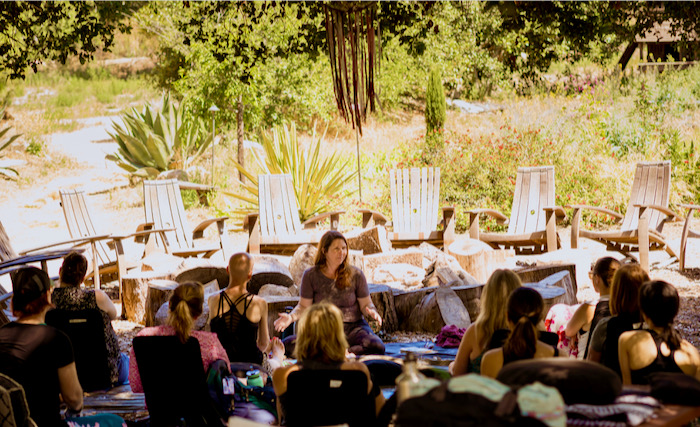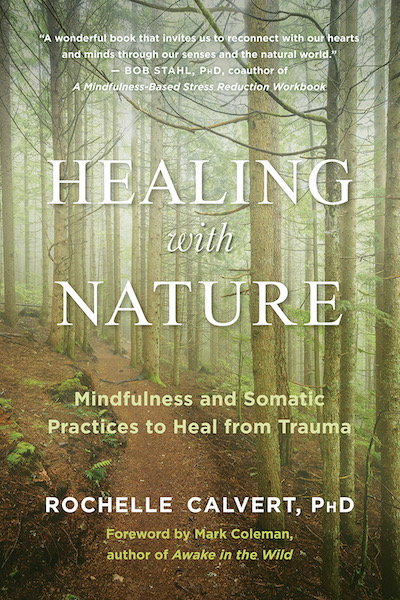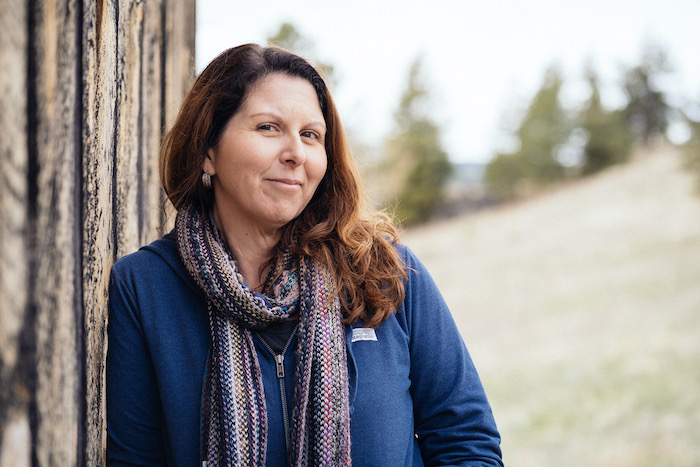.
By DAVID CRUMM
Editor of ReadTheSpirit magazine
After nearly two years of pandemic, simply opening the door to the outside world and gathering with others may seem like a daring step.
For years, Rochelle Calvert had been leading groups of pilgrims into spiritual encounters with the natural world, then her own plans for gatherings were hit by COVID concerns. Now, she is inviting all of us to get a taste of these adventures through her new book, Healing with Nature: Mindfulness and Somatic Practices to Heal from Trauma.
Plus, Rochelle has added free audio meditations, and there are opportunities to meet her and join in her future programs. Of course, she charges for those in-person programs.
This is a good time to discover Rochelle’s work, because she is moving once again toward building a schedule of her signature in-person retreats. She is moving her home base this autumn to Taos, New Mexico—from which she plans to travel to her retreat sites across the Western states in coming years. She currently is booking guests for a November 19-23 retreat at Ghost Ranch, which once was artist Georgia O’Keeffe’s home in New Mexico.
(Note to readers: This is a good time to share this cover story with friends who might also be interested in Calvert’s work. You can do so by using the social-media links on this page, or even by printing out this story to share using the green “PrintFriendly” button at the end. Who knows? Maybe you’ll find a friend who wants to read her book along with you and discuss it—or who might even want to go with you to Ghost Ranch.)
Rediscovering the Natural Roots of Our Faith
The central affirmation that Rochelle makes in her in-person work, her online teaching and in the pages of this book is that each of us can discover our own spiritual pathway toward healing with nature.
“I firmly believe that people need to be free to explore the spiritual paths that will bring them emotional, psychological and physical healing, so I am not trying to direct people into any one faith tradition,” Rochelle said in an interview about her book. “I want to help people to increase their capacity to experience their own faith.”
This approach is possible because all of the world’s religious traditions ultimately rest on truths that are drawn from the natural world and that continue to call followers to connect with the planet.
In 2015, Pope Francis wrote an entire encyclical on this theme, Laudato si’ (On Care for Our Common Home). The letter was so timely that the Vatican’s website crashed shortly after its release because so many people around the world wanted to read Francis’s message. Both Francis and Rochelle start by pointing out the same central dilemma. The pope begins his letter by addressing both the trauma humans are inflicting on the planet—and the trauma humans are experiencing in our own hearts, minds and spirits. The two are eternally related, he argues.
Similarly, Rochelle devotes her entire book to encouraging healthy responses to our collective trauma through a deepening relationship with the natural world. Rather than a lone voice crying in the wilderness, Rochelle’s new book is part of a global chorus, now.
And yet, in a number of ways, her approach also is unique.
Healing Our Many Forms of Trauma
Rochelle certainly is not alone in zeroing in on “trauma” as one of the central sources of the anxiety, conflict and violence we experience daily in our communities. For example, over many years our online magazine has recommended books by Dr. Robert J. Wicks; most recently his The Tao of Ordinariness was the subject of a cover stories. Then, Mindy Corporon, author of Healing a Shattered Soul, is now devoting her professional efforts to Workplace Healing, a project to assist employers in responding to the many traumas experienced in the lives of their employees.
So, then, why are we so strongly recommending Rochelle Calvert’s book and her ongoing work?
Because she is charting new territory with her series of outdoor retreats that take participants to many different locations around the West—as well as adapting those practices to outdoor experiences that readers can develop at home or close to home. As a writer and teacher, she is always thinking about adaptive strategies. She’s a fresh and compassionate voice.
The stories in the pages of her book ring true, because she has distilled them from her own, unique, real-world experiences.
She also is solidly grounded in her field. In the book, Rochelle defines “trauma” in terms summarized from leading international sources. You could find a similar definition, for example, in books by Dr. Wicks. Here is an example in Rochelle’s words, from page 2 of her book:
Traumatic experiences come in many different forms. The psychological community has classically defined traumatic events as including natural disasters, serious accidents, terrorist acts, war, combat, rape and other violent personal assaults. But trauma also can arise from experiences of loss of control, like medical trauma (including life-threatening illness, surgeries and childbirth) and the loss of a loved one. Betrayal, racism, bullying, abuse of power, helplessness, political unrest, pandemics and the climate crisis may also be traumatic experiences for an individual or a society.
In our interview, Rochelle explained, “Through my work and now through this book, I hope that people can learn to wake up and heal from trauma. To help people become healthier, I am encouraging spiritual practices with nature. I’m hoping that people begin by tasting these experiences and that they go on to develop their own unique way of healing through reciprocity with nature.”
In fact, as her book explains, the complex and timeless forces within the natural world can teach us a great deal about resiliency and recovery from trauma. In her opening pages, for example, she describes how the living creatures within the natural world try to regenerate after a disaster. Those regenerative forces often spring from the heart of that trauma.
In her book, she writes:
This is where the wisdom of the natural world can help. Nature has an intrinsic tendency to thrive, and it always works with and toward a traumatic or difficult experience to find a new way of being and restore health. We can see this in the way a tree grows back after a limb is torn off by the wind, or a tiny patch of grass grows up through a crack in concrete.
In 16 chapters across 288 pages, then, Rochelle lays out many of the principles she has found effective in her work with people over the years.
As a powerful bonus, she also adds links to audio meditations that readers of her book can download to enhance their reading experience.
THE AWARENESS OF A CAREGIVER
Over the years, our ReadTheSpirit magazine office has received dozens of review copies of new books about sources of spiritual renewal that humans can find in nature. After all, the idea stretches all the way back to the first book of the Bible, as Pope Francis points out.
What makes Rochelle’s book distinctive within this ongoing flow of books? One welcome feature of Rochelle’s book is that she writes with a veteran caregiver’s concern for readers who are not in perfect health. Countless other books seem to assume that readers are fit and flexible and capable of tackling all manner of outdoor activities. Within the opening sections of Rochelle’s book, she makes a point of stressing that not everyone is capable of every experience.
In a section called “Challenges of Attending to the Breath,” for example, she takes time to address readers who may have breathing concerns, including asthma. This may seem like a simple point, but this kind of real-world compassion for the wide range of our physical bodies is rare in such inspirational books. In a section on “Body Awareness,” Rochelle takes time to encourage readers to approach the ideas she is sharing with “an attitude of kindness and compassion” toward the limitations of our bodies.
‘TASTING WHAT IS POSSIBLE’
“This concern that you are picking up in my book is intentional and I’m glad you’re highlighting it,” Rochelle said in our interview. “For example, I’m a huge proponent of building from small steps until we gradually build up our capacity for some of these bigger experiences. Especially if people are working toward healing from challenging experiences in their lives, like trauma, then we don’t want to start by trying to sit with that in meditation for two hours right out of the gate. That’s probably going to flood us, to overwhelm us and to cause turmoil.
“What I’m encouraging is that people begin by tasting what is possible, like tasting the fruit of new life,” she continued. “We might even start with just five minutes of stepping outside into nature and opening our sensory doors to nature—and that short experience may start a ripple effect that can build day after day. We often undervalue how beneficial even short periods of time can be, especially if we welcome them, build on them and let them take their course in our lives.
“With small increments, we can move from that first tasting to build, day by day, toward real change in our lives and real healing.”
.
Care to Learn More?
GET THE BOOK (and the links to audio meditations that are in the book). Healing with Nature: Mindfulness and Somatic Practices to Heal from Trauma is available from Amazon and other online retailers.
VISIT ROCHELLE’S WEBSITE. In our interview, Rochelle explained that some sections of her website, NewMindfulLife.com, will be updated through this autumn—but the website does contain a wealth of current information and resources. While some areas of the website still are being updated, one current page lists Rochelle’s upcoming schedule. The website also explains how to get in touch with Rochelle, how to sign up for some of her free content—as well as how to register and pay for future programs.
WATCH A BRIEF VIDEO:



